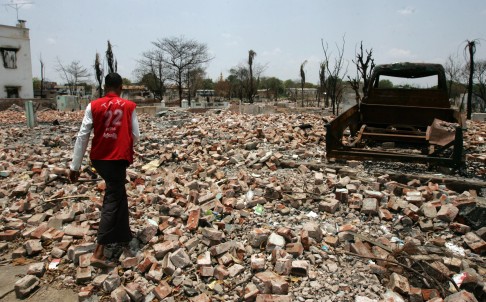A man walks in a site where a
building once stood before sectarian violence between ethnic Rakhine
Buddhists and Muslim Rohingya in western Myanmar. Photo: AP
Terrified
Muslims hid in their homes in northwest Myanmar on Monday after armed
police dispersed a Buddhist mob that torched houses and surrounded a
mosque in the latest outbreak of sectarian tension.
Clashes between majority Buddhists and Muslims have killed at least 237 people and left more than 150,000 homeless since June last year.
The violence threatens to undermine political and economic reforms launched in the two years since a quasi-civilian government replaced a military junta.
The situation in the town of Thandwe was precarious after police restored order by firing shots in the air to break up the mob late on Sunday, said two security sources, who sought anonymity as they were not authorised to speak to the media.
Thandwe, 260 km from the capital Yangon, is in Rakhine state, the worst-hit region. As in several previous bouts of communal unrest, a minor disagreement triggered an outpouring of anger, a local Muslim politician said.
“We’re now scared and hiding inside our homes, like the previous times,” Kyaw Zan Hla, chairman of the Kaman Muslim Party, told Reuters by telephone, adding that about 200 people had joined the mob, some wearing masks and carrying flaming torches.
He said he had himself become embroiled in a row after he objected to a Buddhist man parking a motorcycle in front of his home late on Saturday and rumours spread that he had insulted Buddhism.
Police reported no deaths or injuries from the incident in Thandwe, home to an airport used by tourists who visit resorts on the popular Ngapali beach nearby.
In April, the government said 192 people were killed in June and October last year clashes between ethnic Rakhine Buddhists and Rohingya Muslims, most of whom Myanmar regards as illegal immigrants from Bangladesh, despite roots going back generations.
The United Nations has described the Rohingya as “virtually friendless”.
Clashes between Rohingya and Rakhines in June last year led to unrest elsewhere in the country, where other groups of Muslims have been targeted, including Kamans, who are of different ethnicity from Rohingyas. An estimated five per cent of Myanmar’s population of about 60 million is Muslim.
Clashes between majority Buddhists and Muslims have killed at least 237 people and left more than 150,000 homeless since June last year.
The violence threatens to undermine political and economic reforms launched in the two years since a quasi-civilian government replaced a military junta.
The situation in the town of Thandwe was precarious after police restored order by firing shots in the air to break up the mob late on Sunday, said two security sources, who sought anonymity as they were not authorised to speak to the media.
Thandwe, 260 km from the capital Yangon, is in Rakhine state, the worst-hit region. As in several previous bouts of communal unrest, a minor disagreement triggered an outpouring of anger, a local Muslim politician said.
“We’re now scared and hiding inside our homes, like the previous times,” Kyaw Zan Hla, chairman of the Kaman Muslim Party, told Reuters by telephone, adding that about 200 people had joined the mob, some wearing masks and carrying flaming torches.
He said he had himself become embroiled in a row after he objected to a Buddhist man parking a motorcycle in front of his home late on Saturday and rumours spread that he had insulted Buddhism.
Police reported no deaths or injuries from the incident in Thandwe, home to an airport used by tourists who visit resorts on the popular Ngapali beach nearby.
In April, the government said 192 people were killed in June and October last year clashes between ethnic Rakhine Buddhists and Rohingya Muslims, most of whom Myanmar regards as illegal immigrants from Bangladesh, despite roots going back generations.
The United Nations has described the Rohingya as “virtually friendless”.
Clashes between Rohingya and Rakhines in June last year led to unrest elsewhere in the country, where other groups of Muslims have been targeted, including Kamans, who are of different ethnicity from Rohingyas. An estimated five per cent of Myanmar’s population of about 60 million is Muslim.
This article appeared in the South China Morning Post print edition as Muslims hide after Buddhist rampage

No comments:
Post a Comment